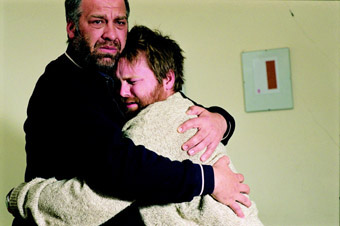St Kilda FIlm Festival: short, not sweet
Rose Capp

Garth Davis' Alice
In a typically pithy speech marking the commencement of this year’s St Kilda Film Festival, director Paul Harris noted the serious, even confrontational nature of many of the films in the program. He remarked that the opening night session reflected the provocative nature of the material many short filmmakers had elected to focus on.
Of the 7 films on offer, comedy and drama were evenly represented, with Ash Wednesday (Jason Tolsher, 2003), The Paddock (Peter Carstairs, 2003) and Alice (Garth Davis, 2003) tackling the grim topics of fratricide, rural isolation and the trauma of stillbirth. While Ash Wednesday suffered from an overly histrionic treatment of the family melodrama, The Paddock and Alice impressed with more considered approaches to their respective subjects.
These films flagged the uncompromising nature of many of the dramas featured in the festival, with topics ranging from pedophilia to suicide. But the opening night session was also instructive in another respect. It featured 3 films that focused on children—Clutch (Jackie Schultz, 2003), Alice and Marco Solo (Adrian Bosich, 2003)—establishing a recurring theme in the overall program. Youth-centered scenarios were conspicuous across all genres and formats including comedy, drama and documentary, and were equally well represented in the festival awards. Of the 150 films that screened at St Kilda, the most inspired were the short dramas that combined a focus on young lead characters with the sort of provocative subject matter Harris alluded to in his introductory comments.
I was less enamoured than the judges with 2 films that featured prominently in the festival awards: Martha’s New Coat (Rachel Ward, 2003) and And One Step Back (Mark Robinson, 2003). While both were undeniably well crafted, with strong performances from their youthful leads, neither tackled the dysfunctional family scenario with particular originality. There was a certain sameness to these polished, child-centered melodramas, to the point where both films featured half-sisters dealing with unreliable mothers and absent fathers.
Two films focusing on young boys, Green Eyes (Diana Leach, 2003) and Ice-Cream Hands (Gavin Youngs, 2002), made a much more powerful impact. The former is a stylistically sophisticated study in sibling rivalry. Leach initially establishes a fairytale feel to her period piece featuring a family who live in a lighthouse. But as the young son’s resentment of his baby sister intensifies, Cordelia Beresford’s atmospheric cinematography gives the film an increasingly surreal and sinister quality.
Gavin Youngs’ Ice-Cream Hands similarly interrogates the idea of childhood innocence, tackling the topic of pedophilia in a courageous and original fashion. Minimal dialogue and an intentionally whimsical visual style mixing naive animation with stylised live action offer an appropriately disturbing take on the subject.
Victim (2003) takes a more oblique approach to the youth oriented theme. Directed and co-written by Corrie Jones, this taut, unsettling drama deals with the violent abduction of a young woman. Beautifully shot and edited, Jones uses odd camera angles and grainy images to register the victim’s point of view. As her voice-over takes on a retrospective tenor, the constant presence of a child suggests innocence irretrievably lost. With a restrained but genuinely shocking denouement, Victim is a strikingly assured work that justifiably won Jones the Best New Director Award in addition to sharing the SBS Eat Carpet Award.
Other films worthy of mention included 2 coming-of-age teen dramas: Redskin (Melanie Horkan, 2003) and Oranges (Kristian Pithie, 2003). The former, with its melancholic tone and compelling teen heroine, recalled Christine Jeffs’ debut feature Rain (2000). Oranges, with sensitive performances from its 2 young male leads, surprised with its unexpected dramatic twist. Mittens (Emma Freeman, 2003) and Postie (Nathan Keene, 2003) positioned their young protagonists in period settings to excellent effect. The former is a moving story of childhood disability and alienation, while the latter’s startling outback imagery provided the 19th century backdrop for a young Aboriginal girl’s struggle to reconcile family and tribal loyalties.
Perhaps the predilection for youth oriented themes in this selection of short films is hardly surprising, given that emerging filmmakers might be drawn more consistently to personal or autobiographical material in the early stages of their careers. More noteworthy is the bleak tenor of most of the films. These are not nostalgic portraits of childhood and adolescence, but troubled sagas of juvenile disaffection, where flawed adults routinely fail their younger counterparts.
Having emphasised the strength of short dramas in the festival, it was striking that the most inspiring documentaries and comedies also addressed childhood and adolescent concerns. Moving (Brodie Higgs, 2003) and Twenty Minutes with Les Twentyman (Anne Wooley, 2003), both produced by Sally Ingleton, explored adolescent isolation and homelessness. But the most telling non-fiction accounts of youthful alienation came from 2 documentaries dealing with children in Australian detention centers. Amanda and Ali (Karen Hodgkins, 2003) is a touching, no-frills portrait of a friendship across the barbed wire fence. Even more compelling, the animated documentary It’s Like That (Southern Ladies Animation Group, 2003) matched the recorded voices of detained children with childlike, animated imagery to heartrending effect. The latter film deservedly took out the award for Best Documentary.
Of the comedies, the cine-literate Confessions of an Animation (Steve Baker, 2004) and the sustained scatological riff Kenny (Clayton Jacobson, 2004) pleased audiences and critics alike. But again, it was the child centered whimsy of the opening night comedies Clutch and Marco Solo that really caught my eye.
As the largest Australian short film festival, St Kilda is a showcase for a diverse range of genres and styles. It is not always possible, or even helpful, to try and identify specific thematic and stylistic concerns across a single festival program. But one thing is evident. Judging by the films sampled in this year’s festival, the current generation of short filmmakers is clearly and commendably not interested in making films for the emotionally faint-hearted.
St Kilda Film Festival 2004, George Cinemas, The Palais Theatre, Melbourne, May 25-30
RealTime issue #62 Aug-Sept 2004 pg. 25






